

15 Hydration Facts for Athletes. Water is a wonderful performance enhancer.
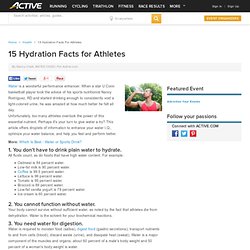
When a star U Conn basketball player took the advice of his sports nutritionist Nancy Rodriguez, RD and started drinking enough to consistently void a light-colored urine, he was amazed at how much better he felt all day. Unfortunately, too many athletes overlook the power of this essential nutrient. Perhaps it's your turn to give water a try? This article offers droplets of information to enhance your water I.Q., optimize your water balance, and help you feel and perform better. More: Which Is Best - Water or Sports Drink? 1. All fluids count, as do foods that have high water content. Oatmeal is 84 percent water. 2. Your body cannot survive without sufficient water, as noted by the fact that athletes die from dehydration. 3.
How to Create a Race-Day Hydration Plan. One of the biggest challenges to an athlete's performance on race day is dealing with fatigue.
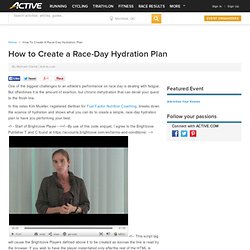
But oftentimes it is the amount of exertion, but chronic dehydration that can derail your quest to the finish line. In this video Kim Mueller, registered dietitian for Fuel Factor Nutrition Coaching, breaks down the science of hydration and shows what you can do to create a simple, race-day hydration plan to have you performing your best. <! Measure Your Sweat Loss for Optimal Hydration. As an athlete and nutrition major I am well informed about the importance of proper hydration in both athletics and everyday life.
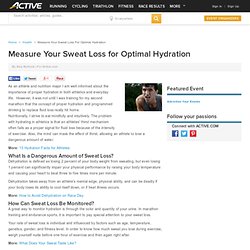
However, it was not until I was training for my second marathon that the concept of proper hydration and programmed drinking to replace fluid loss really hit home. Nutritionally, I strive to eat mindfully and intuitively. The problem with hydrating in athletics is that an athletes' thirst mechanism often fails as a proper signal for fluid loss because of the intensity of exercise. Also, the mind can mask the effect of thirst, allowing an athlete to lose a dangerous amount of water. Consume Electrolytes and Calories Separately. There is a growing trend for endurance athletes to replenish electrolytes and calories separately.
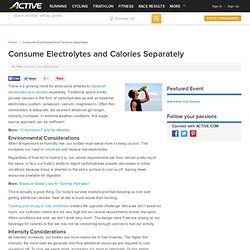
Traditional sports drinks provide calories in the form of carbohydrates as well as essential electrolytes (sodium, potassium, calcium, magnesium). Often this combination is adequate, but as event distances get longer, intensity increases. In extreme weather conditions, this single source approach can be inefficient. More: 15 Hydration Facts for Athletes Environmental Considerations When temperature or humidity rise, our bodies must sweat more to keep us cool.
Regardless of how hot or humid it is, our calorie requirements per hour remain pretty much the same. The New Rules of Hydration. Remember when the only guideline for staying hydrated during exercise was to drink—and drink often?
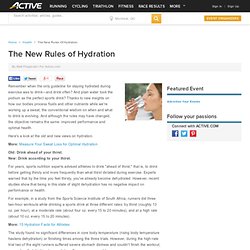
And plain water took the podium as the perfect sports drink? Thanks to new insights on how our bodies process fluids and other nutrients while we're working up a sweat, the conventional wisdom on when and what to drink is evolving. And although the rules may have changed, the objective remains the same: improved performance and optimal health. Here's a look at the old and new views on hydration. How to Create a Race-Day Hydration Plan. Hydration and Electrolyte Tips for Race Day. Think it's a good idea to blow by those aid stations on race day?
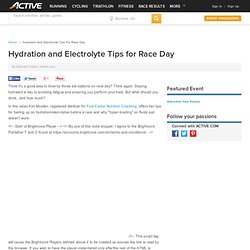
Think again. Staying hydrated is key to avoiding fatigue and ensuring you perform your best. But what should you drink...and how much? In this video Kim Mueller, registered dietitian for Fuel Factor Nutrition Coaching, offers her tips for fueling up on hydration/elecrolytes before a race and why "hyper-loading" on fluids just doesn't work. <! Kim Mueller is a registered dietitian and board certified specialist in sports dietetics, as well as being the founder of Fuel Factor Nutrition Coaching. Liquids And Hydration For Athletes - Care Guide. Get Enough Protein Post-Workout. After exercise, it starts.
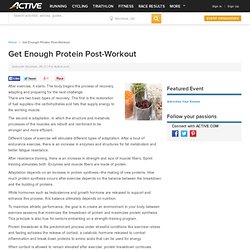
The body begins the process of recovery, adapting and preparing for the next challenge. There are two basic types of recovery. The first is the restoration of fuel supplies--the carbohydrates and fats that supply energy to the working muscle. The second is adaptation, in which the structure and metabolic processes of the muscles are rebuilt and reinforced to be stronger and more efficient. Think you're a true geek? Take our quiz - gadgets break.
How to Create Your Marathon Nutrition Plan. The period of time leading into your next marathon brings a lot of distinct challenges separate to the race itself: tapering, traveling, eating, sleeping, etc.
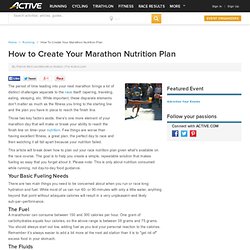
While important, these disparate elements don't matter as much as the fitness you bring to the starting line and the plan you have in place to reach the finish line. Those two key factors aside, there's one more element of your marathon day that will make or break your ability to reach the finish line on time–your nutrition. Few things are worse than having excellent fitness, a great plan, the perfect day to race and then watching it all fall apart because your nutrition failed.
This article will break down how to plan out your race nutrition plan given what's available on the race course. The goal is to help you create a simple, repeatable solution that makes fueling so easy that you forget about it.